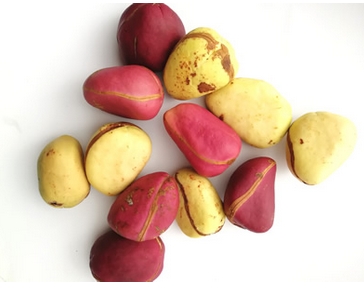
support@yorubalibrary.com
+2348073529208, 07038599574

The kolanut holds a significant place in Yoruba culture, serving as a symbol of hospitality, respect, and spirituality. This small, caffeine-rich nut is more than just a food item; it is deeply woven into the social and religious fabric of Yoruba society. Let’s explore the various aspects of the kolanut's importance in Yoruba culture.
Symbol of Hospitality and Respect
In Yoruba culture, the kolanut is often used to welcome guests. Offering kolanut to visitors is a gesture of hospitality and respect, signifying goodwill and acceptance. The presentation of kolanut is accompanied by prayers and blessings, reflecting the host’s wishes for peace, prosperity, and good health for their guests.
Ritual and Religious Significance
Kolanut plays a vital role in Yoruba religious practices. It is commonly used in rituals, ceremonies, and divination processes. During traditional religious ceremonies, kolanut is offered to deities and ancestors as a sign of reverence and to seek their blessings. The splitting of the kolanut is considered a sacred act, with each segment interpreted to hold spiritual meanings and messages.
Kolanut in Ceremonies and Celebrations
Kolanut is a staple in various Yoruba ceremonies, including weddings, naming ceremonies, and festivals. During these events, the kolanut is shared among participants as a symbol of unity and communal harmony. The act of breaking and sharing the kolanut fosters a sense of togetherness and collective joy among attendees.
Cultural Symbolism and Social Functions
The kolanut is rich in cultural symbolism. It represents life, vitality, and productivity due to its stimulating properties. In social functions, the kolanut is often used to seal agreements, make peace, and resolve conflicts. Its role in such situations underscores its importance as a mediator and a unifying element in Yoruba society.
Health and Medicinal Uses
Beyond its cultural and spiritual significance, the kolanut also has health benefits. It is known for its stimulating effects due to its high caffeine content, providing a natural energy boost. Traditional Yoruba medicine utilizes kolanut for its potential health benefits, including aiding digestion, improving mental alertness, and serving as a remedy for certain ailments.
Conclusion
The kolanut is more than just a nut in Yoruba culture; it is a powerful symbol of hospitality, spirituality, and unity. Its presence in rituals, ceremonies, and social interactions highlights its multifaceted role in fostering community bonds and cultural continuity. Understanding the importance of kolanut offers a deeper insight into the values and traditions that shape Yoruba society.

Learn about the Yoruba concept of Ìwà Pẹ̀lẹ́ (good…

Learn special praises for Divine Being and Creator…